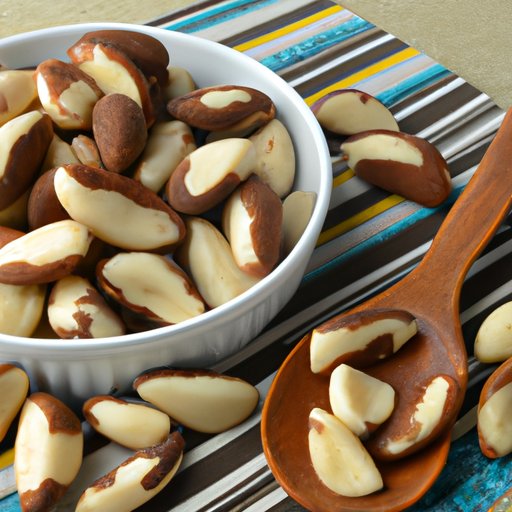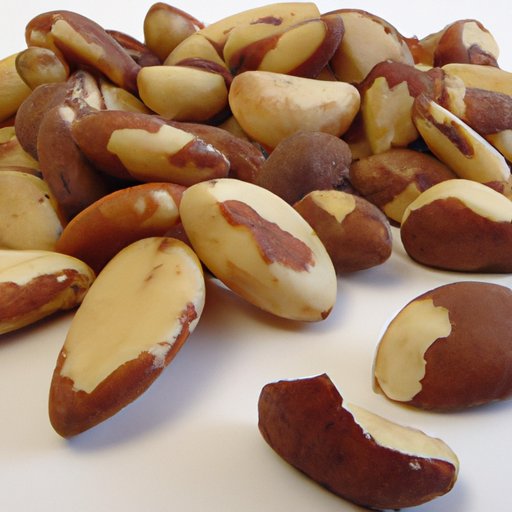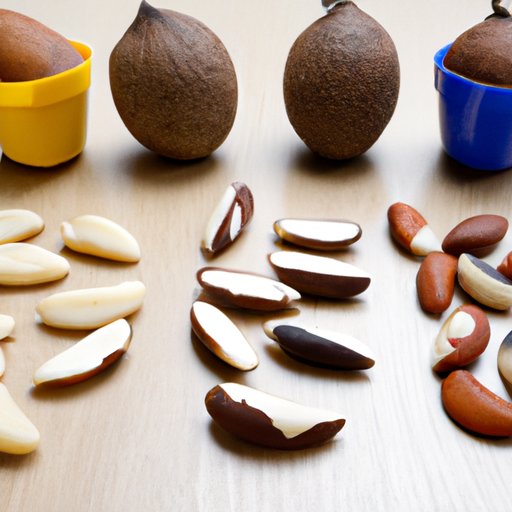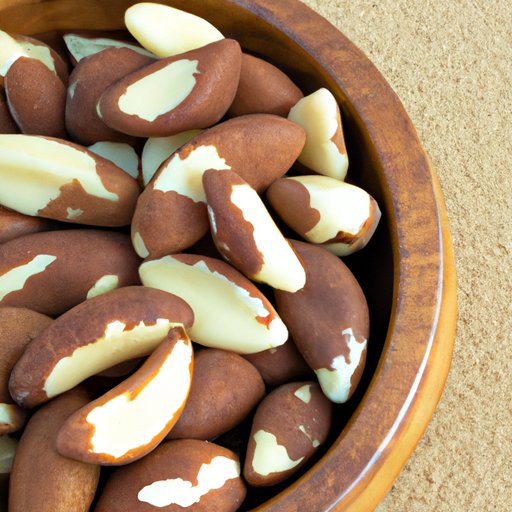Introduction
Brazil nuts are a type of tree nut native to South America that has become popular in regions around the world. They’re most often eaten raw or roasted, either on their own or as an ingredient in salads, snacks, and desserts. But what makes Brazil nuts particularly interesting is their nutrient content. In this article, we’ll explore the potential health benefits and risks of incorporating Brazil nuts into your diet.
Overview of Brazil Nuts
Brazil nuts (Bertholletia excelsa) are the seeds of a large tree native to the Amazon rainforest. The trees can grow up to 150 feet tall and live for hundreds of years. Each tree produces several hundred pods, each containing between 8 and 24 Brazil nuts. Harvesting these nuts is labor-intensive and requires climbing the tree with ladders.
Summary of Nutritional Benefits
Brazil nuts are an excellent source of several key vitamins and minerals, including selenium, magnesium, phosphorus, copper, zinc, and vitamin E. They’re also high in monounsaturated fats and protein. One ounce (about 14 kernels) contains 188 calories, 4 grams of protein, 19 grams of fat, and 2 grams of carbohydrates.

Exploring the Health Benefits of Eating Brazil Nuts
Brazil nuts have been linked to several potential health benefits. Here’s a closer look at some of the research.
Potential Benefits on Heart Health
Eating Brazil nuts may help reduce cholesterol levels and improve other markers of heart health. A study published in the journal Nutrition found that consuming just six Brazil nuts per day for four weeks significantly reduced total and LDL (“bad”) cholesterol levels in people with elevated cholesterol.
Possible Effects on Cancer Risk
The selenium in Brazil nuts may play a role in reducing the risk of certain types of cancer. According to a review published in BioMed Research International, selenium may reduce the risk of prostate, bladder, colon, and lung cancer. Another study found that women who ate two or more Brazil nuts per week had a lower risk of breast cancer than those who didn’t eat any.
Potential Effects on Brain Health
The selenium in Brazil nuts may also help protect against age-related cognitive decline. A study published in the journal Neurology found that adults over age 65 with higher blood levels of selenium were less likely to experience cognitive decline than those with lower levels.
The Role of Brazil Nuts in a Healthy Diet
Incorporating Brazil nuts into your diet can provide a variety of health benefits. Here’s a closer look at the nutrients they offer.
Macronutrient Content of Brazil Nuts
Brazil nuts are an excellent source of healthy fats, protein, and fiber. They’re also low in carbs and contain no trans fats or added sugars. This makes them a great snack for people following a low-carb or ketogenic diet.
Vitamin and Mineral Content of Brazil Nuts
Brazil nuts are an excellent source of several vitamins and minerals. A one-ounce serving provides 67% of the recommended daily value (DV) of selenium, 18% of the DV of magnesium, 10% of the DV of phosphorus, and 8% of the DV of copper. They’re also a good source of vitamin E and zinc.
How to Incorporate Brazil Nuts into Your Meals
Brazil nuts are versatile and can be added to a variety of dishes. They can be eaten raw, roasted, or chopped and added to salads, oatmeal, yogurt, smoothies, and more. They’re also a great addition to trail mix and can be used as a topping for baked goods like muffins and breads.

Potential Risks of Eating Too Many Brazil Nuts
Like all foods, Brazil nuts should be consumed in moderation. Eating too many can lead to unwanted side effects.
Possible Weight Gain
Brazil nuts are high in calories and fat, so eating too many can lead to weight gain. It’s best to limit your intake to 1–2 ounces (14–28 kernels) per day.
Risk of Selenium Toxicity
Brazil nuts are an excellent source of selenium, but eating too many can lead to selenium toxicity, which can cause symptoms such as nausea, vomiting, hair loss, and neurological issues. The tolerable upper limit of selenium is 400 micrograms per day, so it’s best to limit your intake to 1–2 ounces (14–28 kernels) of Brazil nuts per day.

Comparing Brazil Nuts to Other Nuts and Seeds
Brazil nuts are a nutritious food, but how do they compare to other nuts and seeds? Here’s a closer look at their nutritional profile compared to some other commonly consumed nuts and seeds.
Nutritional Profile Comparison
Brazil nuts are relatively high in calories and fat compared to other nuts and seeds. A one-ounce serving of Brazil nuts contains 188 calories and 19 grams of fat, while the same serving of almonds contains 163 calories and 14 grams of fat. However, Brazil nuts are an excellent source of selenium, which is not found in significant amounts in other nuts and seeds.
Potential Health Benefits Comparison
Brazil nuts have been linked to a variety of potential health benefits, including improved heart health, reduced cancer risk, and protection against age-related cognitive decline. Other nuts and seeds have also been linked to similar benefits. For example, almonds have been found to reduce cholesterol levels, while walnuts may help protect against age-related cognitive decline.
Recipes Featuring Brazil Nuts
Ready to start incorporating Brazil nuts into your diet? Here are a few delicious recipes to get you started.
Salads
Try adding chopped Brazil nuts to your favorite salad for an extra crunch. Or make a simple yet flavorful Brazilian Chopped Salad with black beans, tomatoes, red onion, cilantro, lime juice, olive oil, and salt and pepper.
Snacks
For a quick and easy snack, try making homemade Brazil nut butter. Simply blend together Brazil nuts, olive oil, maple syrup, and salt until smooth. Or combine chopped Brazil nuts with dark chocolate chips, dried cherries, and rolled oats for a tasty trail mix.
Desserts
Brazil nuts add a delicious crunch to sweet treats. Try adding chopped Brazil nuts to your favorite cookie or brownie recipe. Or make a decadent Brazilian Chocolate Tart with a nut crust, creamy chocolate filling, and a sprinkle of chopped Brazil nuts on top.
Conclusion
Brazil nuts are an excellent source of several key vitamins and minerals, including selenium, magnesium, phosphorus, copper, zinc, and vitamin E. Eating them may help reduce cholesterol levels, reduce cancer risk, and protect against age-related cognitive decline. However, Brazil nuts are high in calories and fat, so it’s important to consume them in moderation. To get the most out of Brazil nuts, try incorporating them into salads, snacks, and desserts.
Summary of Benefits and Risks
Brazil nuts are an excellent source of several key vitamins and minerals, and they may help reduce cholesterol levels, reduce cancer risk, and protect against age-related cognitive decline. However, they’re high in calories and fat, and eating too many can lead to selenium toxicity.
Recommendations for Incorporating Brazil Nuts into Your Diet
To get the most out of Brazil nuts, try incorporating them into salads, snacks, and desserts. Limit your intake to 1–2 ounces (14–28 kernels) per day to avoid potential side effects.
(Note: Is this article not meeting your expectations? Do you have knowledge or insights to share? Unlock new opportunities and expand your reach by joining our authors team. Click Registration to join us and share your expertise with our readers.)
